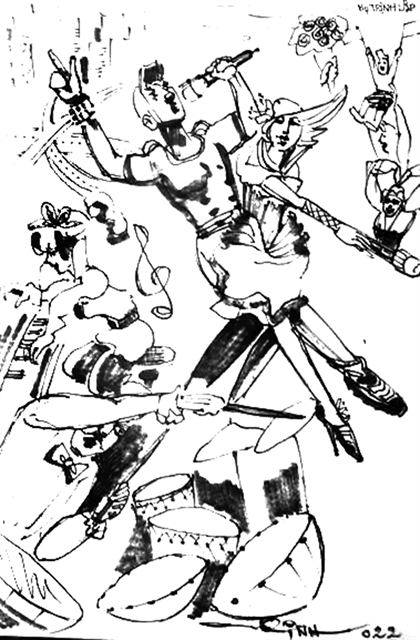 Talk Around Town
Talk Around Town

Last week, a new music video There’s No One at All by Sơn Tùng MTP, a pop star, was ordered to be removed from YouTube and destroyed. The artist, popular among youth, was also fined VNĐ70 million for the video's controversial "suicidal content".

|
| Illustration by Trịnh Lập |
by Nguyễn Mỹ Hà
Last week, a new music video There’s No One at All by Sơn Tùng MTP, a pop star, was ordered to be removed from YouTube and destroyed. The artist, popular among youth, was also fined VNĐ70 million for the video's controversial "suicidal content".
Some young viewers who saw it before the ban said the video was a tour de force of a young person dealing with stress and finally giving in, but the ban was advocated by many parents and educators who held that the video contained a negative message, which could badly affect children, maybe even encouraging them to commit suicide.
Phạm Cao Thái, chief inspector of the culture ministry, said: "Teenagers' depression and suicide are a big concern of the whole society. Therefore, the state management agency has taken action promptly and the violators have also been made aware of and sanctioned."
Music generally has a positive impact on people's lives. It encourages people, soothes their pain, unrolls well-kept sorrows or pushes people to overcome their fears. Music entertains and enlivens.
Music has a powerful impact on the human soul. It penetrates the human ears and directly impacts the brain's neurotransmitters and, as a result, can make people happy or sad.
But music can also touch the deepest level of a human's soul, hypnotising them to do things they would not do if they had not heard these sounds.
In Vietnamese culture, the earliest record of music is as a tool to capture warring armies without any bullets, or so goes the legend of Thạch Sach.
Thạch Sanh was a poor but strong young man. Growing up an orphan, he was befriended by Lý Thông, who saw great benefit in Thạch Sanh's physical strength and wanted him to be siblings sharing a home. Touched by Lý Thông's request to become brothers, Thạch Sanh innocently accepted and moved in to share the household workload with the new family that had an ageing mother.
Thạch Sanh stood for everything genuine, honest and kind-hearted. Lý Thông stood for evil will, manipulation and stealing someone else's credit.
Thạch Sanh relieved local people from a Python Monster that killed people as an annual offering. He rescued a princess from a monstrous Eagle, freeing a son of Water God. When he left for home, of all the precious gifts the God offered, Thạch Sanh only asked for a zither.
Misfortunes never come alone, and Thạch Sanh's journey didn't end there. His sworn brother Lý Thông after stealing credit for killing the Python Monster was praised by the king and promoted to a high court mandarin.
The wandering souls of the python and eagle wanted to take revenge on Thạch Sanh, so they coordinated to trap him. He was arrested by the court and sentenced by his so-called brother.
While awaiting the trial, Thạch Sanh played his zither, singing out his pain and sorrow. The melodies got out of the prison, transmitted far away in the royal court, and even to the ear of the princess, who had suddenly turned mute after getting rescued from the Eagle.
After listening to the music by Thạch Sanh, the princess became joyful again, and the king wanted to reward the musician.
Thạch Sanh told his ups and downs in songs, then the king found out the truth and decided to marry his daughter to Thạch Sanh. After the news spread to neighbouring countries, other kings became angry because their eligible princes were turned down for a pauper with no home or inheritance.
Armies of 18 neighbouring countries decided to wage war over Thạch Sanh and were ready to turn the wedding day into a battle.
Thạch Sanh played his zither with such magical tunes and melodies that it put the aggressive soldiers to sleep. Thạch Sanh invited them to have a meal before they went home.
The zither of Thạch Sanh has become a story of the mighty power of music: it could cure the illness of a sick princess, but also sedate powerful armies.
Music can be a remedy to heal a weak soul, but it can also push a fragile soul over the limit. During this post-pandemic time, the young men and women in their late teens are getting their directions in life and exploring. Supporting attitudes and actions can steer them in the right direction. As a society, there needs to be a social standard for young people to follow.
As idols of youth, singers and musicians impact their fans. Sharing negative thoughts and talking openly can help struggling youths, but steering them toward negative consequences is not wise.
At this tender yet sensitive age, young people follow and listen to their idols much more than their parents and teachers. Rebellious youths tend to do and say the opposite of what their parents and teachers say.
If their social idols cannot tell them what to do right, they need not ask them to do wrong and send damaging messages. Then parents would thank them so much. VNS




